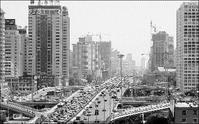Gareth Manning, Sunday Gleaner Writer 
Beijing's central business district May 14, 2007. The city has a major pollution problem that could affect athletes as well as the quality of games in the 29th Olympiad, scheduled to begin in five days.
LOCAL PHYSICIAN Dr Winston Dawes says the poor air quality in Beijing, China, could trigger serious respiratory illnesses in athletes competing in distances of 400 metres and longer at the Games of the 29th Olympiad.
With only five days left to the opening ceremony of the Games, officials in Beijing are still grappling with how to contain air pollution in the city.
On Friday, officials announced an emergency plan - which includes the closure of more factories - to deal with the persistent haze, which has already forced some athletes not to compete in the games.
It has been reported that Ethiopian distance runner Haile Gebreselassie pulled out of the marathon due to the poor air quality. Gebreselassie, a holder of multiple world records, Olympic and World Champion titles, is an asthmatic.
Dawes, a former president of the Jamaica Football Federation and chairman of the GC Foster College board, says distance runners are more likely to be affected by the air pollution than others because they need to breathe in more air. A distance runner breathes in about 10 times more air than the average person.
Bronchial problems
"With those who have had bronchial problems, especially for asthmatics, they are at special risk," Dawes says, as the pollution can trigger an attack.
"The longer distances are too short - unless you have a cold or so on - but anything from 400 metres - which is a sprint - and up, you could see a negative influence," he adds.
Jamaica has about six athletes scheduled to run distances of 400 metres and more in this year's Olympics. At least one of Jamaica's athletes is known to suffer from a respiratory illness.
Beijing has the world's worst nitrogen dioxide levels, according to satellite images taken by the European Space Agency in 2005. The gas can irritate the eyes, nose and throat as well as trigger respiratory illnesses.
The Associated Press reported Wednesday Beijing's pollution levels dropped by more than half over a 24-hour period to 44 on the World Health Organisation's (WHO) index. A reading below 50 is considered acceptable by WHO.
Air pollution in Beijing could be reduced further if official plans to close more factories and shut down construction sites producing harmful gases are successful.
Motorists have already been forced to drive only on certain days, dependent on their licence plate numbers, according to the CNN. Odd numbers are permitted on one day, and even numbers on the next.
Wet weather might also work to the city's advantage as the country enters peak rainy season in August. The rain is expected to cool temperatures and clear some of the smog.
gareth.manning@gleanerjm.com

